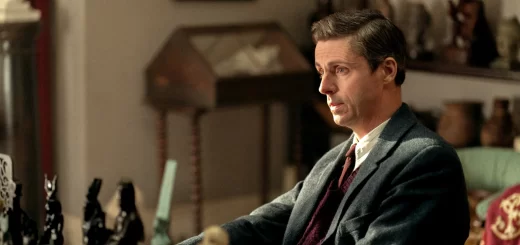Beggars Can’t Be Choosers, by Tyler Smith
Film is often a reflection of the culture, but sometimes it takes a while for those that make film to assess the world around them and decide to take action, at least artistically. But, when that decision is made, we tend to see a rash of movies in quick succession. That’s how it was possible for there to be no movies made about 9/11 for a few years, and then United 93 and World Trade Center came out the same year. The same could be said for the Iraq War; a couple years of assessment, followed by a deluge of anti-war films.
Now that I have seen E.L. Katz’ Cheap Thrills– released shortly after films like The Wolf of Wall Street and Killing Them Softly– I think I’m safe in assuming that the filmmaking community has spent the last couple of years taking a hard look at the current American economy and finally decided it doesn’t like what it sees. Unemployment remains high, debt- both personal and national- continues to rise, and very few solutions have been working as perfectly as promised. We dared to hope that things would get better, but they remain pretty much the same; there hasn’t been a lot of change.
So we get films like Cheap Thrills, which perfectly captures the desperation of most Americans; always trying to do the right thing, but constantly behind the eight ball. We fight each other for jobs, for opportunities, anything that might be able to get us a little bit ahead. And above it all are those that don’t worry. The people whose lives certainly aren’t perfect, but have plenty of money, resources, and support to be as comfortable as possible.
Now more than ever there seems to be not merely a disparity between the haves and have-nots, but an animosity. It seems as though the battle lines have been drawn and most of us are at a clear disadvantage. But we keep striving, because what else can we do?
Cheap Thrills is a perfect encapsulation of this struggle. In it, we have two working class guys- one an upright family man, the other a general low life- pitted against one another for the amusement of a rich couple. The two men not only compete, but regularly resort to judgment and insults, questioning each other’s life choices. Never realizing that the real enemy is the one pulling the strings.
Indeed, the film isn’t subtle about its opinion of the current national economic situation, but its true brilliance comes in its ability to make the story of its characters so specific. Though each character is certainly a metaphor, they don’t lose their individuality. Had that not been the case- had the filmmakers only approached this as pure allegory- the film wouldn’t be nearly as compelling as it is.
Because these are real people we’re dealing with. Each character has strengths and weaknesses, and quirks of personality. Even the characters we don’t like are not without their charms. The fact that the film is often quite funny helps, too. Even when things are at their most dire, there is a healthy dose of gallows humor injected to keep us from despairing too much.
The film is very well-written and edited, but I think the movie’s primary strength is in its cast. It’s principle stars are all actors that are associated more with comedy than high drama, and they bring that sensibility to the film, complete with a total lack of self-consciousness. The things required of Pat Healy, Ethan Embry, David Koechner, and Sara Paxton are certainly not pretty. These characters are often grotesque, both in their behavior and their appearance, and the actors don’t shy away from it. They understand that the only way this film can work is through total commitment on the part of all involved.
Because commitment is the name of the game here. These characters don’t have the option of saying no. Well, they do, technically, but that never lasts long. Any time the rich couple makes an offer that seems too outrageous, they simply up the ante. Everybody has a price and personal morality plays no part; not in this economy. And so we’re treated to scene after scene of humiliation and compromise, until these two relatively civilized men- who used to be old friends- are reduced to little more than animals.
That is what desperation can do to a person. Everything is all well and good until the chips our down and we can’t pay our rent. Or our kid gets sick. Or we lose our job. Certainly, there are plenty of people that don’t make these terrible choices, but Cheap Thrills argues that perhaps they’ve simply never been put in the proper situation to do so. Money can make people do some strange and awful stuff, and that doesn’t stop once you have it.
Nobody gets away clean in Cheap Thrills; that’s what I like about it. While we sympathize more with the two down-and-out guys (how could we not?), that doesn’t make them sympathetic. By the end of the film, everybody has so debased themselves that we’re repulsed by the whole affair. And that is as it should be. We need to see how ugly this all is, otherwise the film’s message wouldn’t stick with us. And when the film is over, we walk out exhausted and uncomfortable, while undoubtedly asking ourselves what we would do in a situation like this. How far would we go? We can only grapple with the answer for so long before we start to realize that there is something deeply wrong with any system in which the reality of such a question seems so very palpable.






























